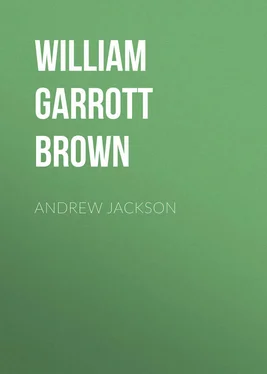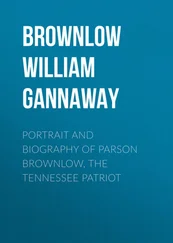William Brown - Andrew Jackson
Здесь есть возможность читать онлайн «William Brown - Andrew Jackson» — ознакомительный отрывок электронной книги совершенно бесплатно, а после прочтения отрывка купить полную версию. В некоторых случаях можно слушать аудио, скачать через торрент в формате fb2 и присутствует краткое содержание. Жанр: foreign_antique, foreign_prose, Биографии и Мемуары, на английском языке. Описание произведения, (предисловие) а так же отзывы посетителей доступны на портале библиотеки ЛибКат.
- Название:Andrew Jackson
- Автор:
- Жанр:
- Год:неизвестен
- ISBN:нет данных
- Рейтинг книги:5 / 5. Голосов: 1
-
Избранное:Добавить в избранное
- Отзывы:
-
Ваша оценка:
- 100
- 1
- 2
- 3
- 4
- 5
Andrew Jackson: краткое содержание, описание и аннотация
Предлагаем к чтению аннотацию, описание, краткое содержание или предисловие (зависит от того, что написал сам автор книги «Andrew Jackson»). Если вы не нашли необходимую информацию о книге — напишите в комментариях, мы постараемся отыскать её.
Andrew Jackson — читать онлайн ознакомительный отрывок
Ниже представлен текст книги, разбитый по страницам. Система сохранения места последней прочитанной страницы, позволяет с удобством читать онлайн бесплатно книгу «Andrew Jackson», без необходимости каждый раз заново искать на чём Вы остановились. Поставьте закладку, и сможете в любой момент перейти на страницу, на которой закончили чтение.
Интервал:
Закладка:
Andrew was thus left an orphan, weakened in body by the smallpox, which he took while he was in prison. Moreover, he bore on his head the mark of a blow from the sword of a British officer whose boots he had refused to polish. No man ever lived who had a simpler human way of loving those who befriended him and of hating those who hurt him than Andrew Jackson; and surely few men ever had better excuse than he for hating the British uniform. His feeling against the British was one of the things that colored his opinions on public questions; the supreme hour of his life was the hour when, at New Orleans, he had his revenge – full measure, heaped up, and running over – for all that he had suffered in the Waxhaws. Scholarly historians, passing rapidly over the events of his childhood, give many pages of learned criticism to the course he took on great public questions in later years, and gravely deplore the terrible passions that swayed him when, no doubt, he should have been as deliberate and calm as they are while they review his stormy life. But for those who would rather understand than judge him it surely cannot seem a small thing that he started out in life with such a heritage of bitter memories, such a schooling in hatred, as few children were ever cursed with. Passion and revenge are wrong, of course, but the sandy-haired, pockmarked lad of the Waxhaws had better excuse than most boys for failing to learn that lesson. It is doubtful, indeed, if any one ever took the trouble to teach it him. One little thing that stuck in his mind probably hurt worse than the sabre cut on his head. He did not even know where his mother's grave was.
It does not appear that during the next seven years, while he was growing to manhood, he gave himself with much industry either to study or to work. For six months he was employed in the shop of a saddler, but he seems to have learned more about filling saddles than about making them, for he became somewhat famous as a horseman even in a country where the love of horseflesh was universal. He got acquainted with some wealthy people from Charleston who were exiled until the British evacuated their city, and lived with them a sporting life which was beyond his means. After the peace he made a visit to Charleston, got into debt, got out of it by winning a wager, and grew somewhat graver in consequence of his experience. There is even some reason to believe that he went to work as a schoolmaster; and doubtless some backwoods schools of that period had masters as ignorant as Andrew Jackson. Finally, he resolved to study law, and in the winter of 1784-5 started out to find an office in which he might prepare himself for his profession. He found a place in the office of Mr. Spruce McCay, of Salisbury, North Carolina, an old-fashioned Southern town, where he made his home until 1788, when he was admitted to the bar.
All that is known of his life at Salisbury accords with what is known of his life at the Waxhaws. He was ready for a frolic or a fight at any hour of the day or night; he excelled in such sports as required swiftness and nerve; he was fond of practical jokes; he was not over fond of study, and never acquired any great knowledge of the law. At twenty, when his studies were finished, he is described as a tall, slender young fellow, with a thin, fair face and deep blue eyes, by no means handsome, but distinguished by considerable grace and dignity of manner; an exquisite rider and a capital shot; of an extraordinarily passionate temper, yet singularly swift, even when his anger was at white heat, to seize upon the right means to protect himself or discomfit an adversary; already somewhat of a leader, not by any eminence of talent or knowledge, but because he had a gift of leadership and was always intensely minded to have his way. The year of his admission to the bar, after a brief stay at Martinsville, a small North Carolina town, he got himself appointed solicitor, or public prosecutor, of the western district of Tennessee, and soon set out for the West.
The appointment of so young a man to such an office seems remarkable until one knows what Tennessee was like at that time, and what duties a solicitor was expected to discharge. The term Tennessee is, in fact, misleading. The region to which Jackson went still belonged to North Carolina, though its inhabitants had but a little while before made an attempt to set up a separate State under the name of Franklin. But of those who made the attempt the great majority had lived in that part of North Carolina's western lands which is now East Tennessee – a mountainous region of which Jonesboro, a squatter town of fifty or sixty log-houses, was the metropolis. Nashville, whither Jackson was bound, was nearly two hundred miles west of Jonesboro, and the Nashville settlement was as yet less than ten years old. It was founded in 1779 by Captain James Robertson with a little company of nine. The next year Colonel John Donelson, with a much larger party, including women and children, came from Virginia to join his friend Robertson. His journey was one of the most striking incidents in the peopling of the West, for it was made in flatboats which passed down the Holston into the Tennessee, down the Tennessee into the Ohio, up the Ohio into the Cumberland, and up the Cumberland to Nashville. It took four months to cover the two thousand miles or more, and there were bloody fights with Indians, sickness, and death by the way. When, eight years later, after an overland journey through a wilderness still almost unbroken and still infested with Indians, Jackson came to Nashville, he found Mrs. Donelson a widow, for her husband had been murdered; and he soon became an inmate of her home.
It was well for a widow in that wild country if she could procure men "boarders," even though she might not need to "take boarders" for a living; for every household needed men to protect it from the Indians. Immigration was increasing constantly, but the white population was still far too small to be safe. Within seven miles of Nashville, during the years 1780-1794, the Indians killed, on an average, one white person every ten days.
Life in such a country was even rougher and barer than in the Waxhaws. The houses were chiefly cabins made of unhewn logs, and the things which in older communities make the inside of houses attractive were almost wholly wanting. Such merchandise as was offered to the settlers had to be fetched hundreds of miles, – usually from Philadelphia, – and grew very dear by the time it reached them. For food, clothing, and shelter each family relied mainly on the handiwork of its own members. As in all frontier regions, the population was chiefly male. The brave women who took their share of the common work and hardship were treated with much respect, and did their part well, no doubt, but they had little leisure for those arts which brighten the lives and refine the characters of husbands and children.
Manners suited conditions. These builders of the West had more strength than gentleness, more shrewdness than wisdom, more courage than culture. They were the rough front which American civilization presented to the wilderness and the savage, – brave, hard-handed, themselves somewhat affected with the barbarism they came to displace, yet in all essentials of character true representatives of their masterful race. They were mainly of English or Scotch-Irish stock; and no other breeds of white men have ever shown such capacity as these two for dealing with inferior races and new countries. Their virtues were courage, energy, alertness, inventiveness, generosity, honesty, truth-speaking; their commonest faults were violence, combativeness, lax ways in business, intemperance, narrowness of mind. They hated foreigners and Indians, and were ready to fight any one who behaved like an enemy or a critic; they held in honor women, their country, and brave men. Shut off from the greater world to the eastward, and having few pleasures such as most Americans may now enjoy, they filled their leisure hours with such sports as hunting, horse-racing, drinking bouts, fights, and lawsuits. The law, indeed, they held in great reverence; that race mark they had in common with all other societies made up of Englishmen and Americans of English descent. But they were even fonder of fighting than of the law, and the particular laws which were at once hardest to enforce and most in need of enforcement were those very simple laws which set forth the principle that private wrongs must be righted in the courts, which stand for the peace of the State, and not by the "wild justice" of revenge.
Читать дальшеИнтервал:
Закладка:
Похожие книги на «Andrew Jackson»
Представляем Вашему вниманию похожие книги на «Andrew Jackson» списком для выбора. Мы отобрали схожую по названию и смыслу литературу в надежде предоставить читателям больше вариантов отыскать новые, интересные, ещё непрочитанные произведения.
Обсуждение, отзывы о книге «Andrew Jackson» и просто собственные мнения читателей. Оставьте ваши комментарии, напишите, что Вы думаете о произведении, его смысле или главных героях. Укажите что конкретно понравилось, а что нет, и почему Вы так считаете.












